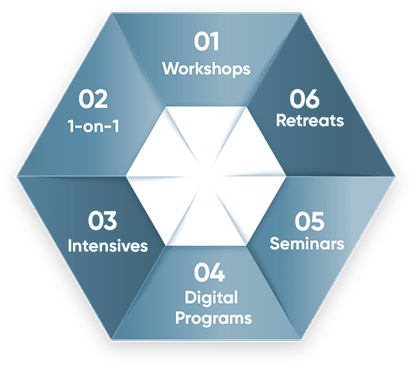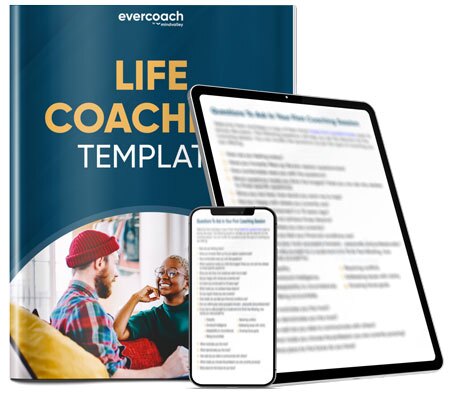Life Coaching Business 101:
The Complete Guide To Getting Started

Starting a life coaching business gives you an incredible opportunity to make a profitable career while making a positive difference in others’ lives.
It’s a calling. A unique career that has tremendous growth opportunities and so much learning!
Unlike any other career, as a life coach, you don’t define goals for your clients. Rather, you align your goals with what they want to achieve for themselves.
If you’ve landed on this guidebook, you’ve probably found your calling to be a life coach and you can’t wait to know more about it. So, let’s get started!
Is Life Coaching ‘The’ Business For You?
Life coaching is one of the fastest-growing professions worldwide. There’s so much to explore as a life coach - leadership, personal improvement, relationship, organizational, career guidance, spiritual coaching, you name it!
A life coach helps individuals dial up the “extraordinary” and experience life to the fullest.
If you are someone:
Who finds happiness in watching people achive their dreams
Who wants to lead a purposeful life and bring a positive change in the world around you
Who want to help others realize their full potential

Then this is 'the' career for you!
And this is also a great time to take up life coaching as a profession.
The pandemic has left the world shaken. More and more people are seeking guidance to find their calling, to do work that makes them happy, and to have a stable professional and personal life.
Also, as sad as it may sound, it took us a pandemic to realize the importance of maintaining a healthy and stress-free lifestyle. If you have skills that can help people live better, more fulfilled lives, this is the time to use them.
However, being a life coach is not about making a quick buck. If you are thinking of this as an easy career - don’t!
Becoming a life coach is a process. You need to be willing to work at it, to learn and grow, and to be open to failure and rejection. You need to constantly evolve your approach and apply what works while removing what doesn’t.
Before you start out as a life coach, check if you would be able to follow the 5 cardinal rules.
5 Cardinal Rules of Life Coaching
01. Be approachable - always!
For you to be able to guide your clients towards their goals, you’ll need to understand their inhibitions, challenges, and aspirations. For this, the client needs to trust you and should feel a certain level of comfort to open up to you. So, break that ice, give them that comfort, and leave judgement out the door.
02. Patience. Patience. Patience
Don’t rush the process. Take your time to understand your client and give them time to trust you with their problems. Don’t promise instant results but work together towards finding a long lasting solution.
03. Go with the flow? NO!
It’s easy for the clients to digress and talk about multiple issues they are facing. While that’s expected, and even good sometimes, it shouldn’t be the norm. It’s your responsibility as a coach, to have a coaching session structure to ensure you keep on track and manage expectations effectively and efficiently.
04. Pay attention to details
There is a lot to read between the lines and decode from a client’s body language and tone. Keep an eye out for problem areas that the client is hesitant to speak about, notice what they talk passionately about, and use these observations to piece the picture together.
05. Don't be a people pleaser
Your clients don’t want a people pleaser but a solution provider. Don’t tell them what they want to hear, but what they need to hear. Even if it is unpleasant sometimes. Be honest with them and don’t shy away from calling a spade a spade. There’s always a way to share the truth with compassion and kindness.
What Is Your Coaching Niche?
The Squirrel Syndrome is having your eye caught by every shiny object that comes along. Deciding to invest in all the shiny objects and learn everything at once.
Before you know it, you have a nest full of shiny objects that you didn’t even need. When starting a new journey, it’s easy to get distracted if there are too many options.

A coaching business is no different. There are multiple domains you can explore as a life coach and each looks like something you could be great at – and lucrative!
Here are some niches you could focus on:
- Leadership Coach
- Health Coach
- Parenting Coach
- Personality development Coach
- Transitional Coach
- Mindfulness Coach
- Relationship Coach
- Financial Coach
- Fitness Coach
- Life Skills Coach
- Motivation Coach
- Mindset Coach
- Spiritual Coach
- Mental Health Coach
- Career Coach
Choice overload?
Feel the squirrel coming out?
STOP.
It’s time to decide the one thing you want to do and be the absolute best at it!
4 ways to figure out your coaching niche
Look at your experience in totality - from that summer workshop you attended, to the courses you took, to the hobby you love. Do some soul searching and find what you love to do. Figure out what people come to you for your advice. Analyze what are the skills you can monetize and coach others in.
Pick a niche that aligns with your passion, purpose, and personality. It could be a subset of a larger theme. For example, if you love the idea of coaching people on fitness, is there something that you can give specialized advice on? Would your niche be workouts, mindfulness, or diet?
Every market has its potential. Most life coaches dream of having large businesses and executives as their clients. But there are also so many successful coaches who reached the 6-figure mark coaching people on relationships, or mindful eating, or personality development. The idea is to find a niche and be really good at it.
Once you have a fair idea of what you want to do, start out as a side hustle. Get honest feedback from people in your close circuit.
Ready to meet your clients? More on defining your potential clients in the next chapter.
Define Your ideal coaching client
Alright, you’ve done your homework on finding a niche offering and are ready to deliver.
The next step is to go deeper and get to know your ideal client.
Who exactly is an ideal client?
Your ideal coaching clients is the person who needs your skills and knowledge to help them through their fears, struggles, and doubts.
This is the person who wants to work with you to overcome obstacles towards their goal. This is the person who wants to take action and is willing to commit to it

You want to get to the core of understanding your ideal client’s profile in terms of their wants, needs, and desires to effectively market to them and get qualified leads. Let’s detail out your ideal client.
Close your eyes for a minute and imagine your ideal client. Think about them in as much detail as possible and then answer these questions:
Psychographic Factors
Psychographic Factors
That’s some epic detailing you did and your job is done, right? WRONG! You need to make an offer; your clients can’t refuse. More on this, in the next chapter.
Craft your coaching offers
Now that you know your audience, the next step is to define your coaching offers. This is where you detail out the format, the duration, the type and number of your coaching modules, and the kind of revenues you want to generate.
Why Do You Need A Framework?
It helps your clients know the days and ways you are available.
You can adopt differential pricing for the basic and extensive offers.
You get time to redefine and rediscover your content.
You can schedule your travel, focus on your other commitments, and can balance work and life.
You can avoid reaching the stage of burnout.
Structuring Your Offer
Here are a few things to help you create a structure.
Degree of Formality - This is about the design of your course content. How do you take your clients through a coaching engagement. Do you follow a direction, but are otherwise flexible to adapt to client needs? Or do you have a rigid structure that goes step-by-step with minimal deviation?

Interaction - How do you interact with your clients? Is it a group coaching session or do you prefer working 1-1? Do you host retreats or have seminars and intensives?

Medium - How do you coach your clients? Is it virtually in online sessions or in person?

Type of Material - What kind of assets do you use to help your clients learn and grow? Do you create learning guides, videos, assignments, etc? A collection of these materials will create a coaching module - which is one structured section of a course. Multiple modules strung together help your client move towards a desired outcome.
We recommend using the (DSP) Desire-Solution-Package Framework to create your coaching packages. Read more about this framework here.
Where To Start?
Do your research on pricing: Check for similar offerings in the market and account for the time, resources, and efforts you put into structuring your course.
Create your package: Decide what you are going to offer your clients in an enrollment call. This is your answer to how you will help them. Do you offer individual sessions or an 8-session package? How much is that priced at? Is there a value differential in terms of price if people go for more sessions? How do you conduct those sessions? For instance, your package could be 10 life coaching sessions of 1 hour each delivered via zoom.
Have more conversations: Practice makes perfect. As you have more and more enrollment conversations you’ll realise what offers work best for you and your clients. What gives you the most value for your time and the most number of conversions. If need be, don’t hesitate to course correct.
Get Your First Client
Your very first client will always be special. Being coached is a significant investment of money, time, and emotions and for your first client to show their confidence in you is a big deal!
There is no one-size-fits-all strategy for client acquisition.
Each coach has a unique offering and hence needs a different strategy to reach out to potential clients.
However, here are a few tried-and-tested ways to get the ball rolling.

Use the power of digital media: Social media is the most effective tool at your disposal. You can create lead generation campaigns, use analytics to monitor who is engaging with your content, and reach out to your potential audience in many different forms - emails, blogs, newsletters, in-app videos, memes, and so many amazing ways.
If you want the work, network! Networking is the key to all things great. There’s no other way to put it - know people and let people know you! Be active in different circles, be regular at attending events, conferences, and workshops. Start by setting personal targets like attending 2 events per month. Help others in whatever capacity you can and then let karma play its game.
Build a personal brand: Be known. Work on getting the visibility you deserve. Invest in creating something unique and add on to your brand value. Also, the good old rule of quality service every time.
All you need to do is speak! Look for opportunities to deliver a winning pitch - in the elevators, at social gatherings, at speakership events, anywhere where you have access to your potential clients. If possible, give a workshop or seminar on your topic of expertise. You’ll position yourself as an expert and be the first choice of attendees looking for that kind of support.
Read that data! Analyze the different sources of leads. Segment the type of audience interested in your courses and build customized messages and offers for them. Use insights for allocating promotion funds. Set-up automated campaigns for email marketing.
Create free content: The idea is to share your knowledge without adding a transaction. For example, at Evercoach we publish high-value content, like this guide, every week. This is available at no cost for everyone. We also have great video content on our YouTube channel, our podcast, blog, and more coaching guides like this one! All freely available. A content channel like this will also help you gauge the response of your potential clients and become a lead-gen funnel.
How To Enroll A Potential Client
So, a potential client has reached out interested in working with you. What’s next?
Schedule a brief one-on-one call to discuss expectations with your potential client before closing the enrollment. This is a free discovery call of hardly 15-20 minutes to evaluate the possibility of working together.
The reason here is simple; when the right person experiences what coaching with you means, they are more than willing to invest in paid coaching.
This brief call is my elevator pitch - not too detailed but just everything that ensures the client can trust me with their problems. Don’t get into explaining the details of your offers, you should have a landing page or a ready template to be shared on mail. The call is about building trust and showing value for your client’s money.
Take time to prepare a brief pitch. Write it down, crunch it down, practice it aloud, and perfect it with every revision.
Soon you’ll start to anticipate the questions on call and will learn how to tackle them with practice.
Confidence is the key here, if a prospective client has agreed to get on a quick call, chances are that he/she is already convinced to work with you and is considering this to be a formality or a first step.
Get comfortable conducting client calls and especially with talking about your methodology and offer. This will help you overcome any fears and ensure that you don’t “freeze” when you come to the end of your discovery call.
5 ways to build your personal brand

#1 Create a website or a social media presence
Having a kick-ass website that reflects your personality is great, but for first time coaches it can be cost intensive. If you can create a one-page website, great! Give it the tone you’d like to be associated with. List down your offers with a call to action. Share a little about your personal story and let your clients see the real you behind your content.
However, if building a website isn’t feasible financially in the beginning, create a social media presence on the channels where your clients are. Have a detailed Facebook business page or create a beautiful Instagram grid. Build a resume on LinkedIn if that’s where your target audience is.

#2. Build a tribe
Connect with like-minded people who believe in the same vision as you. Look for opportunities to co-create something together. Something like a podcast series or maybe a blog together. Help each other grow while working towards your respective dreams
#3. Market yourself
Explore options like content marketing, conducting demos, being guest speakers, building a social media presence, and digital marketing to get visibility and create a strong online presence.
#4. Build trust
Let your work do the talking. Aim for client delight and not just client satisfaction. Deliver quality work and on time.
#5. Don’t hesitate to reinvent
We outgrow our visions and are evolving every minute. It’s not just a need but a necessity to continuously reinvent to be a better version of ourselves. So, keep learning and charting your own path.
How to structure a life coaching session
Conduct a powerful session with any life coaching client
Our free life coaching template will allow you to show up with confidence and leave a memorable impression on any life-coaching client.

